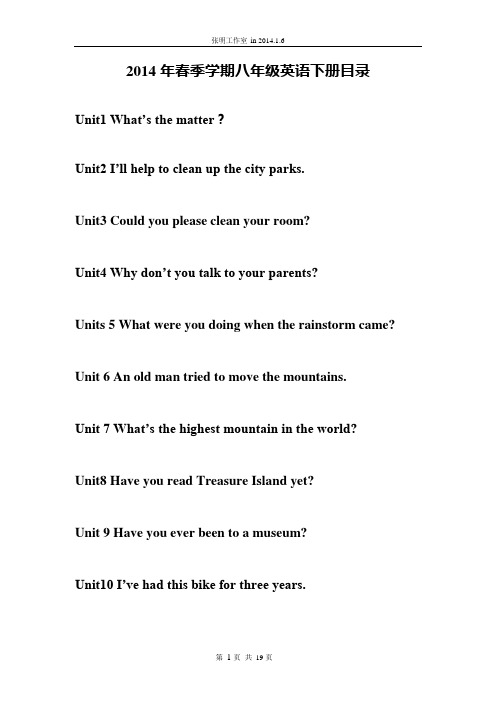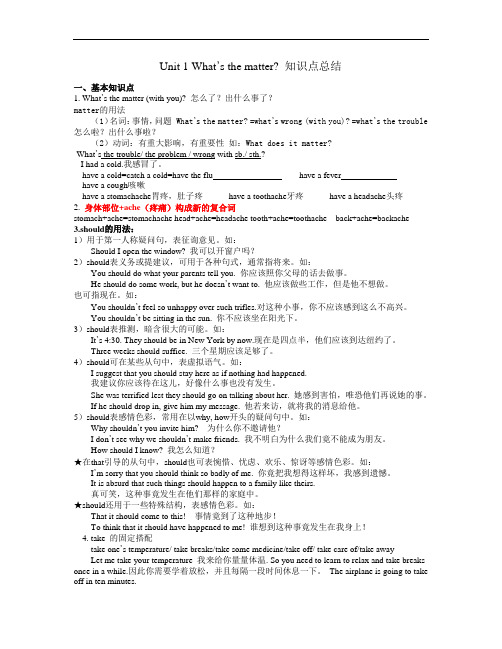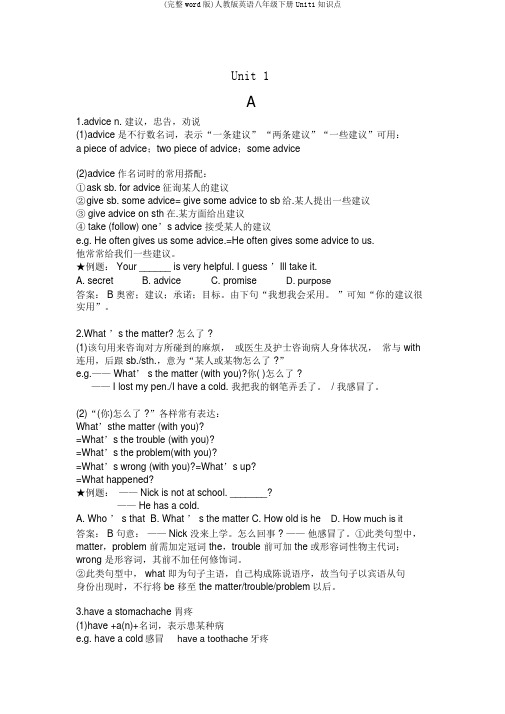(完整word版)人教版八年级下册英语unit1课文重难点讲解
人教版英语八年级下册 Unit1_教材解读

Unit1 名师教材解读1. Textbook Analysis教材解读本单元以“健康与急救(Health and first aid)”为话题,围绕健康问题,学会表达伤病疼痛,正确地给予急救建议。
Section A在内容上侧重健康问题,从身体部位的名称,伤病名称的词汇入手,句型上把握“What’s the matter (with...)? I have a cold/fever/...”。
语法上重点突出表达身体不适的句型结构,包括学会使用含有动词have, hurt的表达方式及情态动词should表达建议。
在情感态度方面,3a-3c 部分利用公交司机停车救人的故事来发展学生阅读技能,扩展学生学习相关语言表述的同时,通过课堂讨论进行情感态度价值观的教育。
Section B在话题上,从Section A中侧重围绕健康问题谈论疾病及不适转向对事故伤害,急救(first aid)的讨论。
在语言上,进一步综合训练和巩固Section A中所学语言重点,但是更加丰富了词汇及相关表述。
按照教材内容,也可以特别对急救的步骤和顺序进行训练。
在技能上,综合了听说能力,突出阅读训练。
在教学策略上,要引导学生利用作者对事件先后顺序的发展描述来理解整篇内容。
在情感上,引导学生学会面对生活中的困难及陷入困境时,要坚强、独立、勇敢、果断、理智。
像Section B长文章中的主角一样,树立抓住哪怕是一丝希望也永不言放弃的精神,热爱生活,珍惜生命。
1.1Section A 1a 活动1a是Lead-in部分。
旨在通过复习绝大部分学生以前学习过的关于身体各部位的词汇,为下面的身体不适的表达法做准备。
学生对本部分词汇有一定的基础,可通过直观手段学习该部分的词汇,对发音做纠正。
如果部分词汇有困难,教师及时处理这部分后,即可过渡到身体不适的表达,从已知到新知。
1.2Section A 1b-1c 活动1b-1c是Listening and speaking部分。
人教版八年级下册英语unit1课文重难点讲解(可编辑修改word版)

2014 年春季学期八年级英语下册目录Unit1 What’s the matter?Unit2 I’ll help to clean up the city parks.Unit3 Could you please clean your room?Unit4 Why don’t you talk to your parents?Units 5 What were you doing when the rainstorm came? Unit 6 An old man tried to move the mountains.Unit 7 What’s the highest mountain in the world?Unit8 Have you read Treasure Island yet?Unit 9 Have you ever been to a museum?Unit10 I’ve had this bike for three years.Unit1 What’s the matter?Section A1.What’ s the matter? 怎么啦?出什么事情了?【解析】matter/ ' mætə(r)) /n.问题;事情What’ s the matter with you?= What’s the trouble with you?= What’ s wrong with you?你怎么了?【注】:matter 和trouble 为名词,其前可加the 或形容词性物主代词,wrong 是adj. 不能加the【2013 自贡3】18. —What’s the matter Tom. He is wet through.—His car ran the river.A.with; inB.to; intoC.with; into【用法】用于询问某人有什么病或某人遇到什么麻烦、问题其后跟询问对象时,与介词with 连用。
最新新人教版八年级英语下册unit1知识点说课讲解

Unit 1 What’s the matter? 知识点总结一、基本知识点1. What’s the matter (with you)? 怎么了?出什么事了?matter的用法(1)名词:事情,问题 What’s the matter? =what’s wrong (with you)? =what’s the trouble 怎么啦?出什么事啦?(2)动词:有重大影响,有重要性如:What does it matter?-What’s the trouble/ the problem / wrong with sb./ sth.?-I had a cold.我感冒了。
have a cold=catch a cold=have the flu have a feverhave a cough咳嗽have a stomachache胃疼,肚子疼have a toothache牙疼have a headache头疼2. 身体部位+ache(疼痛)构成新的复合词stomach+ache=stomachache head+ache=headache tooth+ache=toothache back+ache=backache3.should的用法:1)用于第一人称疑问句,表征询意见。
如:Should I open the window? 我可以开窗户吗?2)should表义务或提建议,可用于各种句式,通常指将来。
如:You should do what your parents tell you. 你应该照你父母的话去做事。
He should do some work, but he doesn’t want to. 他应该做些工作,但是他不想做。
也可指现在。
如:You shouldn’t feel so unhappy over such trifles.对这种小事,你不应该感到这么不高兴。
You shouldn’t be sitting in the sun. 你不应该坐在阳光下。
人教版八年级英语下册Unit 1知识点

人教版八年级英语下册Unit 1知识点人教版八年级英语下册Unit 1知识点Unit 1 Will people have robots?重点语法:一般将来时态的应用do/does 的一般将来时态形式:(shall/will) dodo/does 的一般将来时态的被动语态:(shall/will)be done一般将来时态的肯定句、否定句、疑问句形式:肯定句例句:People will have robots in a few years.否定句例句:People (will not/won't) have robots in a few years.一般疑问句例句:Will people have robots in a few years?特殊疑问句例句:What will people have in a few years?重点短语:won't = will notthey'llwillshe'll = she willhe'll = he willI'll = I willfall in love with(sb./sth.)爱上(某人/某物)be able to do sth. 能够做某事come true 实现uture 未来hundreds of 数以百计的thousands of 数以千计的look for(sb./sth.)寻找(某人/某物)will → would 情态动词 will 的原形和过去式may → might 情态动词 may 的原形和过去式Reading Strategy(阅读方法)Look ale and picture, and predict what you will read about. (看着标题和图片,预知你要阅读那些方面的内容。
)This helps you get ready to acquire new information. (这样可以帮助你获得一些新的信息。
人教版八年级下册英语Unit1知识点(K12教育文档)

人教版八年级下册英语Unit1知识点(word版可编辑修改)编辑整理:尊敬的读者朋友们:这里是精品文档编辑中心,本文档内容是由我和我的同事精心编辑整理后发布的,发布之前我们对文中内容进行仔细校对,但是难免会有疏漏的地方,但是任然希望(人教版八年级下册英语Unit1知识点(word版可编辑修改))的内容能够给您的工作和学习带来便利。
同时也真诚的希望收到您的建议和反馈,这将是我们进步的源泉,前进的动力。
本文可编辑可修改,如果觉得对您有帮助请收藏以便随时查阅,最后祝您生活愉快业绩进步,以下为人教版八年级下册英语Unit1知识点(word版可编辑修改)的全部内容。
Unit1 What's the matter? 名词:matter 问题;事情stomachache 胃痛;腹痛stomach 胃;腹部foot 脚;足neck 颈;脖子throat 咽喉;喉咙fever 发烧X—ray X射线;X光toothache 牙痛headache 头痛break 间歇;休息passenger 乘客;旅客trouble 问题;苦恼knee 膝盖climber 登山者;攀登者situation 情况;状况kilo(=kilometer)千克;公斤rock 岩石knife 刀blood 血importance 重要性;重要decision 决定;抉择spirit 勇气;意志death 死亡nurse 护士动词:lie 躺;平躺hurt (使)疼痛;受伤hit (用手或器具)击;打mean 意思是;打算;意欲形容词:sick 生病的;有病的sore 疼痛的;酸痛的代词:herself 她自己ourselves 我们自己介词:onto 向;朝兼类词:rest v&n 放松;休息cough n&v 咳嗽risk n&v 危险;风险;冒险control n&v 限制;约束;管理off adv&prep 离开(某处);不工作;从…去掉短语:have a cold 感冒have a stomachache 胃痛have a fever 发烧lie down 躺下take one’s temperature 量体温take breaks=take a break 休息get off 下车get on 上车to one’s surprise 使……惊讶的是right away 立即;马上get into 陷入;参与take risks=take a risk 冒险run out(of)用尽;耗尽cut off 切除get out of 离开;从……出来be in control of 掌握;管理give up 放弃be used to doing sth 习惯于…;适应于…used to do sth 过去常常做某事知识点:1、What's the matter?怎么了?What's the matter with sb?某人怎么了?询问某人或周围发生了什么事情=What’s wrong?=What's the trouble/problem?例:—What's the matter?—I have a cold。
人教八年级下册Unit-1知识点详解(K12教育文档)

(完整word版)人教八年级下册Unit-1知识点详解(word版可编辑修改) 编辑整理:尊敬的读者朋友们:这里是精品文档编辑中心,本文档内容是由我和我的同事精心编辑整理后发布的,发布之前我们对文中内容进行仔细校对,但是难免会有疏漏的地方,但是任然希望((完整word版)人教八年级下册Unit-1知识点详解(word版可编辑修改))的内容能够给您的工作和学习带来便利。
同时也真诚的希望收到您的建议和反馈,这将是我们进步的源泉,前进的动力。
本文可编辑可修改,如果觉得对您有帮助请收藏以便随时查阅,最后祝您生活愉快业绩进步,以下为(完整word版)人教八年级下册Unit-1知识点详解(word版可编辑修改)的全部内容。
unit 11. What’s the matter (with you)?怎么了?出什么事了?What’s the trouble/ the problem / wrong with sb。
/ sth.? = What’s up? = What happens to sb.?【注】:matter 和trouble 为名词, 其前可加the 或形容词性物主代词, wrong 是adj。
不能加the.【习】:—What’s the matter ______ Tom. He is wet through. —His car ran _______ the river。
A.with; in B。
to; into C.with; into【拓展】matter的用法(1) It doesn't matter 没关系(用来回答别人道歉时的用语)【习】:—I’m very sorry. I broke your tea cup. —__________.A. It doesn’t matterB. You’d better notC. Take it easy D。
It’s too bad (2) as a matter of fact= in fact 事实上,实际上2.I had a cold. 我感冒了。
(完整word版)人教版英语八年级下册Unit1知识点

Unit 1A1.advice n. 建议,忠告,劝说(1)advice 是不行数名词,表示“一条建议”“两条建议”“一些建议”可用:a piece of advice;two piece of advice;some advice(2)advice 作名词时的常用搭配:①ask sb. for advice征询某人的建议②give sb. some advice= give some advice to sb给.某人提出一些建议③ give advice on sth在.某方面给出建议④ take (follow) one’s advice 接受某人的建议e.g. He often gives us some advice.=He often gives some advice to us.他常常给我们一些建议。
★例题: Your ______ is very helpful. I guess ’Ill take it.A. secretB. adviceC. promiseD. purpose答案: B 奥密;建议;承诺;目标。
由下句“我想我会采用。
”可知“你的建议很实用”。
2.What ’s the matter? 怎么了 ?(1)该句用来咨询对方所碰到的麻烦,或医生及护士咨询病人身体状况,常与 with 连用,后跟 sb./sth.,意为“某人或某物怎么了 ?”e.g.—— What’ s the matter (with you)?你( )怎么了 ?—— I lost my pen./I have a cold. 我把我的钢笔弄丢了。
/ 我感冒了。
(2)“(你)怎么了 ?”各样常有表达:What’sthe matter (with you)?=What’s the trouble (with you)?=What’s the problem(with you)?=What’s wrong (with you)?=What’s up?=What happened?★例题:—— Nick is not at school. _______?—— He has a cold.A. Who ’ s thatB. What ’ s the matterC. How old is heD. How much is it答案: B 句意:—— Nick 没来上学。
八年级人教版英语下册unit1知识点总结

八年级人教版英语下册unit1知识点总结Unit1是八年级英语下册的第一单元,主要围绕“the sentence”这一主题展开。
在学习中,我们需要掌握一些重要的知识点,本文将对这些知识点进行总结。
一、句子的构成句子是表达完整意义的语言单位,主要由主语、谓语和宾语三部分构成。
其中,主语是句子的主要话题或动作的执行者,通常位于句子的最前面;谓语是句子的核心,描述主语的动作或状态;宾语是句子的补充说明,通常位于谓语之后。
句子的构成还包括句子成分和句子成分的分类。
句子成分包括主语、谓语、宾语、表语、定语和状语等。
句子成分的分类主要有三种,即主谓结构、主、谓、宾结构和主系表结构。
二、句子的种类英语中根据句子的用途和表达方式,可以分为陈述句、疑问句、祈使句和感叹句四种。
其中,陈述句用来陈述事实、肯定或否定某种情况,一般语序为主谓宾,常以句号结尾;疑问句用来询问问题,通常以问号结尾;祈使句用来表达请求、命令或建议等语气,通常省略主语,以动词原形开头;感叹句用来表达强烈的情感,常以感叹词或how引导。
三、句子的语态和时态英语中的语态有两种,即主动语态和被动语态。
主动语态表示主语执行动作,而被动语态则表示主语受到动作的影响。
时态是句子非常重要的一部分,用来表示动作发生的时间。
英语中时态主要有现在时、过去时和将来时三种。
其中,现在时表示现在或经常性的动作;过去时表示过去发生的动作;将来时表示将来要发生的动作。
四、句子的修辞手法修辞手法是指用以增强语言表现力的一些技巧或方法,英语中常见的修辞手法包括比喻、拟人、排比、反问、设问、修饰语等。
其中,比喻是常用的一种修辞手法,用来通过两个事物之间的共性来形象地说明某一现象或情况,增强语言的表现力。
拟人则是将非人事物或抽象物质化为人来进行描述,以增强表达的感染力。
以上是八年级人教版英语下册Unit1的知识点总结,希望能够对大家在学习中有所帮助。
- 1、下载文档前请自行甄别文档内容的完整性,平台不提供额外的编辑、内容补充、找答案等附加服务。
- 2、"仅部分预览"的文档,不可在线预览部分如存在完整性等问题,可反馈申请退款(可完整预览的文档不适用该条件!)。
- 3、如文档侵犯您的权益,请联系客服反馈,我们会尽快为您处理(人工客服工作时间:9:00-18:30)。
2014年春季学期八年级英语下册目录Unit1 What’s the matter?Unit2 I’ll help to clean up the city parks.Unit3 Could you please clean your room?Unit4 Why don’t you talk to your parents?Units 5 What were you doing when the rainstorm came? Unit 6 An old man tried to move the mountains.Unit 7 What’s the highest mountain in the world?Unit8 Have you read Treasure Island yet?Unit 9 Have you ever been to a museum?Unit10 I’ve had this bike for three years.Unit1 What’s the matter?Section A1. What’ s the matter? 怎么啦?出什么事情了?【解析】matter/ ' mætə(r)) /n.问题;事情What’ s the matter with you?= What’s the trouble with you?= What’ s wrong with you?你怎么了?【注】:matter 和trouble 为名词,其前可加the 或形容词性物主代词,wrong 是adj. 不能加the【2013自贡3】18. —What’s the matter ______ Tom. He is wet through.—His car ran _______ the river.A.with; inB.to; intoC.with; into【用法】用于询问某人有什么病或某人遇到什么麻烦、问题其后跟询问对象时,与介词with连用。
即:What’s the matter with sb.?= What’s your trouble?= What’s up?= What happens to sb.?—What’s the matter with you ?—I have a bad cold.( ) ①What’s ____ with you?A. troubleB. the matterC. the wrongD. matter( )②—______?—Nothing serious , but a bit tired.—Better have a rest now, dear.A. Is that allB. Is there anything elseC. What’s thisD. What’s the matter with you【2013湖北孝感】—_________?—I have a headache and I don’t feel like eating anything.A. How are youB. What can I do for youC. What’s the matter with youD. How do you like it【2011.云南昆明】27. —What’s the matter with Tina?—_______________.A. She is away.B. She is cool.C. She has a sore throat.D. She should take some medicine【拓展】matter的用法(1) It doesn’t matter 没关系(用来回答别人道歉时的用语)( ) —I’m sorry to break your pen. —_______A. That’s rightB.It doesn’t matterC. Thank you【2013江苏徐州】3. —Please don't throw paper on the ground.—________,I won't.A. Excuse meB. That's all rightC. SorryD. It doesn't matter【2013黑龙江齐齐哈尔】17.-I have a pain in my back.-_____ . You’d better see a doctor.A. I’m sorry to hear thatB. Nothing seriou sC. It doesn’t matter【2013湖北武汉】39. —I’m very sorry. I broke your tea cup.—__________.A. It doesn’t matterB. You’d better notC. Take it easyD. It’s too bad【2013四川广安】26.—Sorry, I'm late again.—______.A.That’s OK B.It doesn't matter C.Good idea (2) as a matter of fact= in fact 事实上, 实际上2. I have a cold 我感冒了I have a stomachache 我患胃痛I have a sore back. 我背痛。
【解析1】have a cold 受凉;感冒have a/an + 疾病名词“患……病”(cold/fever/cough)have a sore throat 患喉咙痛have a sore back 患背痛have a fever 发烧have a cold =catch a cold 患感冒have a stomachache 患胃痛have a toothache患牙痛have a headache 患头痛have a backache患背痛①Mike’s sister _________________(not have) a s tomachache.【2012曲靖中考】I didn’t sleep well last night, because I _____ a toothache .A. wasB. wentC. hadD. took【2013山东莱芜】—Tony, What’s ___ matter with you?—I have _____ toothache.A. a; theB. the; aC. /; theD. the; /【解析2】back n 背;背部at the back of......在......的后面go/come back 返回give back 归还【解析3】3.hand n 手hand in hand 手拉手V 交给;传递hand in 上交hand on 依次传递hand out 分发4. She talked too much yesterday and didn’t drink enough water.她昨天说话太多了并且没有喝足够的水。
( ) Mr. Smith eats ______ food, so he’s _____ fat.A .much too; too muchB .too many; much tooC. too much; too muchD. too much ;much too【2013孝感】—Why are you so tired these days?—Well, I have ________ homework to do.A. too muchB. too manyC. much tooD. many too【2013广西玉林】—The meat is ____ delicious.—Yes, but don’t eat _____.A. too much; too muchB. much too; too muchC. too much ; much tooD. much too; much too【解析2】enough 的用法(1) adj.足够的,充分的修饰名词时,可放在名词之前或之后enough time(2) adv. “足够地,十分,相当”修饰adj./adv,放在adj./adv 后expensive enough(3) be +adj. +enough to do sth be strong enough to carry the box.( ) ①The boy isn’t ___ to dress himself.A. old enoughB. enough oldC. old( ) ②—What do you think of the lecture of Li Yang’s Crazy English?—I think it’s _____ , but someone thinks it’s much too _____.A. wonderful enough; boredB. enough wonderful; boringC. wonderful; enough; boringD. enough wonderful ; bored【2013绥化3】26. —How do you like the talk show?—I think it’s ________, but some people think it’s so________.A. wonderful enough; boredB. enough wonderful; boringC. wonderful enough; boring5. drink some hot tea with honey.喝一些加蜂蜜的热茶。
【解析】with :⑴prep “具有,带有” , 表示某物带有或具有某种特征。
She is a girl with long hair.with (反)without( ) He has a sore throat . He should ______.A. see a dentistB. drink hot tea with honeyC. drink a lot of milkD. eat nothing【2010宁夏1】25. —Would you like some coffee?—Yes, and please get me some milk. I prefer coffee ____ milk.A. withB. toC. ofD. on【2013达州3】15. —Which would you prefer, coffee or orange juice?— Either _________ OK, but I prefer coffee __________milk in it.A.are, withB. is, to C .is, with D. are, to【2013连云港】30. — I'd like a cup of black coffee. What about you, Maggie?— I prefer coffee ________ sugar.A. thanB. forC. withD. to⑵prep. 和......一起I like to talk freely with my friends.⑶ prep 用......,表示“使用某种工具”Cut it with a knife.6. see a dentist and get an x- ray. 看牙医并且拍张x光。
